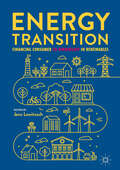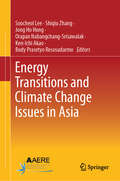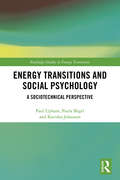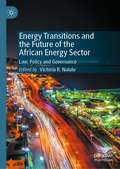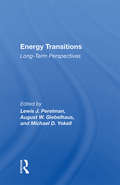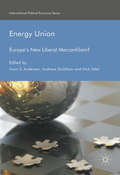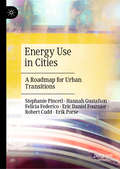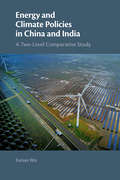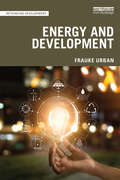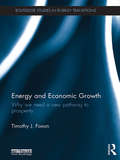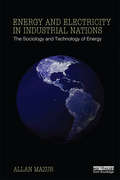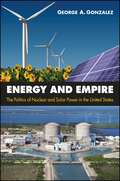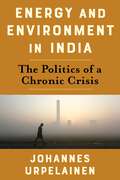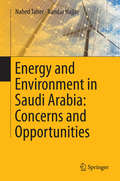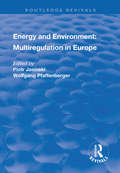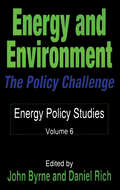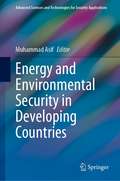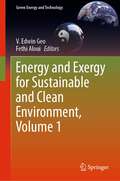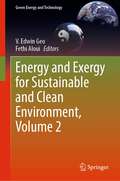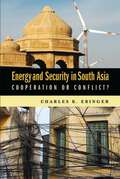- Table View
- List View
Energy Transition: Financing Consumer Co-Ownership in Renewables
by Jens LowitzschConsumer (co-)ownership in renewable energy (RE) is essential to the overall success of Energy Transition. In June 2018, the European Union agreed on a corresponding enabling framework as part of a recast of the Renewable Energy Directive (RED II). The transposition of these comprehensive rules – in particular those on local RE communities – requires developing, implementing and rolling out business models that broaden the capital participation of consumers. The challenge is to include municipalities and/or commercial investors like SMEs and advance to economies of scale while retaining the benefits of individual consumer participation.This book is addressed to energy consumers in local communities, their municipalities and to the policy makers who represent them. Additionally, non-EU countries, in particular those where rural areas have limited access to energy, e.g. in Asia, Africa and Latin America, may be interested in the benefits of consumer ownership. While demand for energy in developing countries is growing, access to energy is crucial for improving the quality of life. The editor of this book presents a new model of consumer ownership in RE for both the EU and countries worldwide. Part One describes the rationale for consumer ownership in RE with regard to social, organizational, legal and financial conditions. Part Two discusses the issue of financing RE and introduces a new financing technique, the Consumer Stock Ownership Plan (CSOP), comparing it to traditional models. Part Three provides 18 country studies from Europe, North America, South America and Asia, organized so as to enable a cross-country comparison of policy approaches and feasibility. Policy recommendations are based on the results of this survey. Part Four summarizes, compares the best practice cases, presents a cost-benefit analysis of “prosumage” and against this background evaluates the impact on future policy.
Energy Transitions
by Alain Nadaï Olivier LabussièreThis book elucidates what it means to transition to alternative sources of energy and discusses the potential for this energy transition to be a more democratic process. The book dynamically describes a recent sociotechnical study of a number of energy transitions occurring in several countries - France, Germany and Tunisia, and involving different energy technologies - including solar, on/off-shore wind, smart grids, biomass, low-energy buildings, and carbon capture and storage. Drawing on a pragmatist tradition of social inquiry, the authors examine the consequences of energy transition processes for the actors and entities that are affected by them, as well as the spaces for political participation they offer. This critical inquiry is organised according to foundational categories that have defined the energy transition - ‘renewable’ energy resources, markets, economic instruments, technological demonstration, spatiality (‘scale’) and temporality (‘horizon(s)’). Using a set of select case studies, this book systematically investigates the role these categories play in the current developments in energy transitions.
Energy Transitions and Climate Change Issues in Asia
by Soocheol Lee Ken-Ichi Akao Budy Prasetyo Resosudarmo Shiqiu Zhang Jong Ho Hong Orapan Nabangchang-SrisawalakThe rapid pace of economic development and urbanization in Asia have led to several major problems such as greenhouse gas emissions, mass consumption, and depletion of natural resources. These problems pose a major threat to a sustainable future for Asia and are hindering many Asian countries' goal of becoming carbon-neutral by the middle of this century. Solving these problems requires a comprehensive understanding of the nature of energy consumption, exploitation of natural resources, and deterioration of the environment.To accelerate the green energy transition and promote efficient resource use in Asia, a range of policy options and joint efforts among Asian countries will be required, including carbon pricing, resource tax reform, the expansion of transition finance, support for the development of low-carbon, and resource-efficient social infrastructure. However, Asia is home to many countries, each in a different stage of economic development and with its own culture and customs. Practical implementation of these policies will require bringing together researchers, policymakers, and citizens to share their knowledge and engage in discussions to generate policy ideas that are appropriate for each country. The purpose of this book is to share theoretical and empirical knowledge and convey policy implications that can be expected to accelerate energy transition and resource use effectiveness toward a sustainable future in Asia.
Energy Transitions and Social Psychology: A Sociotechnical Perspective (Routledge Studies in Energy Transitions)
by Paul Upham Paula Bögel Katinka JohansenThis book explains how social psychological concepts can be closely integrated with sociotechnical perspectives of energy transitions. It shows the value of actor-centred analysis that acknowledges the role of individual-level processes within their wider contexts of energy supply and use. In this way, the book connects social psychological and sociological frames of analysis, preserving the value of both, to provide multi-level, analytically extended accounts of energy transitions processes. Sociotechnical thinking is about the interactions of people and technology, including the rules, regulations and institutions involved. Such perspectives help to identify the many forms of path dependency that can make change difficult. Human behaviour plays a strong role in maintaining these path dependencies, but it can also introduce change. This book advocates a deliberately interdisciplinary research agenda that recognises the value of social psychological perspectives when seeking to create new pathways for energy supply and use. At the same time, it also demonstrates the value of sociotechnical perspectives for energy-related social psychology. Energy Transitions and Social Psychology will be of great interest to students and scholars of energy transitions, environmental and energy psychology, sustainable development and innovation studies, as well as students and scholars of environment and energy more generally.
Energy Transitions and the Future of the African Energy Sector: Law, Policy and Governance
by Victoria R. NaluleThis book explores current developments in the African energy sector and highlights how these are likely to be affected by the ongoing global efforts to transition to a low-carbon economy. It analyses the legal, regulatory and policy frameworks at the national and regional level as they relate to Energy transition in Africa and discusses how regionalism is increasingly utilized to tackle energy access and climate change challenges. Using case studies from across the continent, several key thematic issues, including gender justice, social license to operate, local content and conflict of energy laws are covered in detail. The authors also uniquely examine the progressive nature of global energy use and introduce the new concept of ‘Energy Progression.’ This book will be an invaluable reference for researchers and policymakers looking for a comprehensive overview of the field.
Energy Transitions: Long-term Perspectives
by Lewis J. PerelmanThis book is among the first to examine the social, political, economic, and environmental dimensions of major long-term changes in the systems of energy supply and use. Providing a uniquely holistic perspective on the dynamics of energy and societal changes, the authors examine historical examples of major energy transitions--from petroleum and na
Energy Union
by Andreas Goldthau Nick Sitter Svein S. AndersenThis book contributes to an ongoing debate about the EU as a global actor, the organization's ability to speak with one voice in energy affairs, and the external dimension of the regulatory state. Investigating whether the Energy Union amounts to a fundamental shift towards Europe's new 'Liberal Mercantilism', it gathers high-level contributors from academia and the policy world to shed light on the changing nature of the EU's use of power in one of its most crucial policy fields. It argues that the Energy Union epitomizes a change in the EU's approach to managing its economic power. Whilst the EU remains committed to a liberal approach to international political economy, it seems ready to promote regulation for the purpose of augmenting its own power at the expense of others, notably Russia. This edited collection will appeal to political scientists, economists and energy experts.
Energy Use in Cities: A Roadmap for Urban Transitions
by Stephanie Pincetl Hannah Gustafson Felicia Federico Eric Daniel Fournier Robert Cudd Erik PorseIn an era of big data and smart cities, this book is an innovative and creative contribution to our understanding of urban energy use. Societies have basic data needs to develop an understanding of energy flows for planning energy sustainability. However, this data is often either not utilized or not available. Using California as an example, the book provides a roadmap for using data to reduce urban greenhouse gas emissions by targeting programs and initiatives that will successfully and parsimoniously improve building performance while taking into account issues of energy affordability. This first of its kind methodology maps high-detail building energy use to understand patterns of consumption across buildings, neighborhoods, and socioeconomic divisions in megacities. The book then details the steps required to replicate this methodology elsewhere, and shows the importance of openly-accessible building energy data for transitioning cities to meet the climate planning goals of the twenty-first century. It also explains why actual data, not modeled or sampled, is critical for accurate analysis and insights. Finally, it acknowledges the complex institutional context for this work and some of the obstacles – utility reluctance, public agency oversight, funding and path dependencies. This book will be of great value to scholars across the environmental sectors, but especially to those studying sustainable urban energy as well as practitioners and policy makers in these areas.
Energy and Change: A New Materialist Cosmotheology (Insurrections: Critical Studies in Religion, Politics, and Culture)
by Clayton CrockettAs humanity continues to consume planetary resources at an unsustainable rate, we require not only new and renewable forms of energy but also new ways of understanding energy itself. Clayton Crockett offers an innovative philosophy of energy that cuts across a number of leading-edge disciplines. Drawing from contemporary philosophies of New Materialism, non-Western traditions, and the sciences, he develops a comprehensive vision of energy as a material process spanning physics, biology, politics, ecology, and religion.Crockett argues that change is foundational to material reality, which is ceaselessly self-organizing. We can observe energy’s effects in the operations of natural selection as well as those at work in human societies. Matter and energy are not an oppositional binary; rather, they are expressions of how change functions in the universe. Ultimately, Crockett argues, we can conceive of God neither as a deity nor as a being but as the principle of change.Informed by cutting-edge theoretical discourses in thermodynamics, science studies, energy humanities, systems theory, continental philosophy, and radical theology, Energy and Change draws on theorists such as Gilles Deleuze, Catherine Malabou, Slavoj Žižek, Karen Barad, Bruno Latour, and Kojin Karatani as well as ideas about spirituality, society, and nature from Amerindian, Vodou, and Neo-Confucian traditions. A foundational work in New Materialist philosophy of religion, this book offers compelling new insights into the structure of the cosmos and our place in it.
Energy and Climate Policies in China and India: A Two-Level Comparative Study
by Fuzuo WuThe book explores the proactive and reactive features of China and India's domestic and foreign policies to address two intertwined challenges: first, China and India have taken policy measures that accord with their own domestic priorities; second, both countries have had to alter the trajectory of their proactive policy measures as a result of external pressures. The book argues that China and India's proactive and reactive policy measures to address energy insecurity and climate change have been shaped by their two-level pressures. At the domestic/unit level, both countries have had to sustain fast economic growth and eradicate poverty in order to maximize their economic wealth. At the international/systemic level, both countries have sought to enhance their great power status in the international system which is characterized by not only asymmetrical interdependence but also global governance in general, and global energy and climate governance in particular.
Energy and Development (Rethinking Development)
by Frauke UrbanThis book explores the complex relationship between energy and development and discusses the core issues and concepts surrounding this growing area of research and policy. In the field of energy and development, the world faces two major challenges: (1) Providing energy access to the roughly one billion people worldwide who do not have access to electricity and the nearly three billion people worldwide who do not have access to clean cooking fuels; (2) achieving socioeconomic development while limiting global atmospheric temperature increases to 2 degrees Celsius to mitigate climate change. Taking stock of progress, Frauke Urban explores the key issues surrounding these goals and addresses the policy responses aimed at ending energy poverty and achieving sustainable development. She outlines various options for delivering energy access, analyses past and prospective energy transitions and examines the social, environmental, economic and technological implications of these possibilities. Taking a holistic and multi-disciplinary approach and containing useful teaching resources, Energy and Development provides a comprehensive overview of this complex field of study. This book will be a great resource for postgraduate and undergraduate students, scholars, practitioners and policymakers working in the fields of energy studies, international development, environmental studies, industrial engineering, as well as social sciences that relate to energy and development.
Energy and Economic Growth: Why we need a new pathway to prosperity (Routledge Studies in Energy Transitions)
by Timothy J. FoxonAccess to new sources of energy and their efficient conversion to provide useful work have been key drivers of economic growth since the industrial revolution. Western countries now need to transform their energy systems and move away from the single-minded pursuit of economic growth in order to reduce our carbon emissions, and to allow the environmental space for other countries to develop in a more sustainable way. Achieving this requires understanding of the dynamics of economic and industrial change with appreciation of the dependence of economies on ecological systems. Energy and Economic Growth thus examines the links between three issues: history of energy sources, technologies and uses; ecological challenges associated with the current dominant economic growth paradigm; and the future low carbon energy transition to mitigate human-induced climate change. Providing a historical understanding of the relevant connections between physical, social and economic changes, the book enables the reader to better understand the connection between their own energy use and global economic and environmental systems, and to be able to ask the right questions of our political and business leaders. This is a valuable resource for students, scholars and policy makers with an interest in energy, climate change and economic thinking.
Energy and Electricity in Industrial Nations: The Sociology and Technology of Energy
by Allan MazurEnergy is at the top of the list of environmental problems facing industrial society, and is arguably the one that has been handled least successfully, in part because politicians and the public do not understand the physical technologies, while the engineers and industrialists do not understand the societal forces in which they operate. In this book, Allan Mazur, an engineer and a sociologist, explains energy technologies for nontechnical readers and analyses the sociology of energy. The book gives an overview of energy policy in industrialised countries including analysis of climate change, the development of electricity, forms of renewable energy and public perception of the issues. Energy is a key component to environment policy and to the workings of industrial society. This novel approach to energy technology and policy makes the book an invaluable inter-disciplinary resource for students across a range of subjects, from environmental and engineering policy, to energy technology, public administration, and environmental sociology and economics.
Energy and Empire: The Politics of Nuclear and Solar Power in the United States
by George A. GonzalezWhat set the United States on the path to developing commercial nuclear energy in the 1950s, and what led to the seeming demise of that industry in the late 1970s? Why, in spite of the depletion of fossil fuels and the obvious dangers of global warming, has the United States moved so slowly toward adopting alternatives? In Energy and Empire, George A. Gonzalez presents a clear and concise argument demonstrating that economic elites tied their advocacy of the nuclear energy option to post-1945 American foreign policy goals. At the same time, these elites opposed government support for other forms of energy, such as solar, that cannot be dominated by one nation. While researchers have blamed safety concerns and other factors as helping to arrest the expansion of domestic nuclear power plant construction, Gonzalez points to an entirely different set of motivations stemming from the loss of America's domination/control of the enrichment of nuclear fuel. Once foreign countries could enrich their own fuel, civilian nuclear power ceased to be a lever the United States could use to economically/politically dominate other nations. Instead, it became a major concern relating to nuclear weapons proliferation.
Energy and Environment in India: The Politics of a Chronic Crisis (Center on Global Energy Policy Series)
by Johannes UrpelainenIndia is driving some of the most important trends in global energy markets—with vast environmental implications. As the country grows wealthier, Indians are buying more cars, air conditioners, plane tickets, and other goods that increase demand for fossil fuels. At the same time, the country still faces widespread poverty, and it struggles to address persistent environmental and energy-sector problems, from frequent power outages to a significant number of deaths linked to air pollution.Johannes Urpelainen provides an expert guide to India’s energy and environmental issues that incorporates both domestic and global perspectives. He details how unequal economic development and rapid population growth have brought the country to its current state: a potential engine of the world economy hampered by environmental hazards and energy poverty. Urpelainen argues that institutional shortcomings have led wealthier Indians to find private solutions that protect them from threats such as air pollution and heat waves, but exclude the poor. The retreat of the rich limits the state’s ability to regulate the energy sector or address environmental degradation. Urpelainen examines India’s most severe environmental crises, considering how climate disruptions are affecting the country’s present and future. He analyzes India’s role in global environmental politics and assesses the prospects of achieving a more sustainable society. Useful and accessible, this book also offers pragmatic solutions to help overcome the constraints on effective energy and environmental policy.
Energy and Environment in Saudi Arabia: Concerns & Opportunities
by Nahed Taher Bandar HajjarThe vast oil resources in Saudi Arabia have for decades encouraged a generous system of oil subsidies, making the Kingdom one of the leading countries in the world with the cheapest domestic price of oil. Such subsidies have, however, encouraged inefficient utilization of oil, which is largely consumed in the power, water and transportation sectors, contributing substantially to CO2 emission in the country. These problems are exacerbated by demographic dynamics, urbanization, changes in income and consumption patterns, and industrialization. On current trends of domestic consumption patterns, Saudi Arabia will consume the whole of the oil it will produce by 2030, which will reflect negatively on the financial capacity of the government to execute its development programs. It is this revenue constraining concern, rather than ecological challenges, that has started to attract policy attention in Saudi Arabia. This book gives a unique perspective on these challenges by looking at them as investment opportunities, not financial constraints on the government budget. It sets out to examine the nature and extent of the energy and environmental challenges facing Saudi Arabia, and to explore various options for turning these challenges into profitable investment opportunities that could create jobs, boost income, develop capability in clean energy technology and promote environmental sustainability.
Energy and Environment: Multiregulation in Europe (Routledge Revivals)
by Piotr Jasinski Wolfgang PfaffenbergerThis title was first published in 2000. Using the latest surveys and original data, this volume contrasts energy and environmental policies in Western and Eastern Europe. In doing so, it provides an overview of European environmental regulation as a whole and suggests how best developments in the mature market economies of the West may be adapted for the transition economies of the East.
Energy and Environment: The Policy Challenge (Energy And Environmental Policy Ser.)
by John Byrne Daniel RichOriginally published in 1991, this volume number 6 in the Energy Policy Studies series focuses on important interconnections between energy use and global change issues such as upper atmosphere ozone depletion and global warming. Policy options for meeting these challenges are explored in eight contributed chapters that concentrate on Energy and the Environment, economic growth and industrialisation in Europe, a comparison of solar and nuclear options, as well costs surrounding electricity generation and sustainable development.
Energy and Environmental Justice: Movements, Solidarities, and Critical Connections
by Tristan PartridgeThis book reconnects energy research with the radical, reflexive, and transformative approaches of Environmental Justice. Global patterns of energy production and use are disrupting the ecosystems that sustain all life, disproportionately affecting marginalized groups. Addressing such injustices, this book examines how energy relates to structural issues of exploitation, racism, colonialism, extractivism, the commodification of work, and the systemic devaluing of diverse ‘others.’ The result is a new agenda for critical energy research that builds on a growing global movement of environmental justice activism and scholarship. Throughout the book the author reframes ‘transitions’ as collaborative projects of justice that demand structural change and societal shifts to more equitable and reciprocal ways of living. This book will be an invaluable resource for students, scholars, and practitioners interested in transforming energy systems and working collectively to build just planetary futures.
Energy and Environmental Security in Developing Countries (Advanced Sciences and Technologies for Security Applications)
by Muhammad AsifThis book presents a comprehensive account of the energy and environmental security perspectives of the developing countries. To address the subject comprehensively, it covers four geographically diverse clusters of developing countries from across the world. The regions particularly focused on are: South Asia, South East Asia, Sub Sahara Africa, and Latin America. It is a valuable contribution to the debate, and policy and research activities around the subjects of energy and environmental security in the developing countries and beyond.The book covers the interwoven subjects of energy security and environmental security in the context of developing countries for the first time. It discusses the latest dimensions, challenges, and solutions around taking into account technical, economic, social, and policy perspectives. It incorporates up-to-date data, case studies, and comparative assessment.This edited book has contributions from established as well as emerging scholars from around the world. It benefits a wide range of stakeholders from the fields of energy, environment, and sustainable development. It is of help to academics, researchers, and analysts in these fields besides having appeal for policymakers, and national and international developmental organizations. It also helps developing countries to learn from each other’s experiences.
Energy and Exergy for Sustainable and Clean Environment, Volume 1 (Green Energy and Technology)
by Fethi Aloui V. Edwin GeoThis multi-disciplinary book presents the most recent advances in exergy, energy, and environmental issues. Volume 1 focuses on fundamentals in the field and covers current problems, future needs, and prospects in the area of energy and environment from researchers worldwide. Based on some selected lectures from the Eleventh International Exergy, Energy and Environmental Symposium (IEEES-11) and complemented by further invited contributions, this comprehensive set of contributions promote the exchange of new ideas and techniques in energy conversion and conservation in order to exchange best practices in "energetic efficiency." Included are fundamental and historical coverage of the green transportation and sustainable mobility sectors, especially regarding the development of sustainable technologies for thermal comforts and green transportation vehicles. Furthermore, contributions on renewable and sustainable energy sources, strategies for energy production, and the carbon-free society constitute an important part of this book.
Energy and Exergy for Sustainable and Clean Environment, Volume 2 (Green Energy and Technology)
by Fethi Aloui V. Edwin GeoThis multi-disciplinary book presents the most recent advances in exergy, energy, and environmental issues. Volume 2 focuses on fundamentals in the field and covers current problems, future needs, and prospects in the area of energy and environment from researchers worldwide. Based on some selected lectures from the Eleventh International Exergy, Energy and Environmental Symposium (IEEES-11) and complemented by further invited contributions, this comprehensive set of contributions promote the exchange of new ideas and techniques in energy conversion and conservation in order to exchange best practices in "energetic efficiency." Included are fundamental and historical coverage of the green transportation and sustainable mobility sectors, especially regarding the development of sustainable technologies for thermal comforts and green transportation vehicles. Furthermore, contributions on renewable and sustainable energy sources, strategies for energy production, and the carbon-free society constitute an important part of this book.
Energy and Geopolitics
by Per HögseliusThe idea that energy shapes and is shaped by geopolitics is firmly rooted in the popular imagination – and not without reason. Very few countries have the means to secure their energy needs through locally available supplies; instead, enduring dependencies upon other countries have developed. Given energy’s strategic significance, supply systems for fuels and electricity are now seamlessly interwoven with foreign policy and global politics. Energy and Geopolitics enables students to enhance their understanding and sharpen their analytical skills with respect to the complex relations between energy supply, energy markets and international politics. Per Högselius guides us through the complexities of world energy and international energy relations, examining a wide spectrum of fossil fuels, alongside nuclear and renewable energies. Uniquely, the book also shows how the geopolitics of energy is not merely a matter for the great powers and reveals how actors in the world’s smaller nations are as active in their quest for power and control. Encouraging students to apply a number of central concepts and theoretical ideas to different energy sources within a multitude of geographical, political and historical contexts, this book will be a vital resource to students and scholars of geopolitics, energy security and international environmental policy and politics.
Energy and Security in South Asia
by Charles K. EbingerEconomic growth and burgeoning populations have put South Asia's energy security in a perilous state. Already energy and power shortages are stunting development in some of the region's least developed locations spurring political insurgences and social dislocation. Should this trend continue, Ebinger argues the Subcontinent will face dire economic, social and political crises. In Energy and Security in South Asia, Brookings ESI director Charles Ebinger, a long-time adviser to South Asian governments, lays out the current regional energy picture arguing that the only way to achieve sustainable energy security is through regional collaboration both within the subcontinent as well as with regional neighbors in the Middle East and Central and Southeast Asia,Dr. Ebinger commences by illustrating the present-day energy environment in each nation as well as the obstacles governments confront in addressing them. Among the issues examined are: (1) the technical strains that near double-digit economic growth are putting on India's dilapidated power infrastructure, (2) the economic costs the country is incurring by increasing reliance on the Middle East for oil and gas resources; (3) the prospects for expanded wind, solar, energy efficiency and nuclear power generation in India to help reduce the nation's growing carbon footprint as it accelerates the use of coal; (4) the implications of Pakistan's expanded use of coal; (5) an analysis of how poor energy pricing systems are bringing about an energy shortage throughout the region (6) an examination of how strains in Indo/Bengali relations threaten the construction of vital regional energy infrastructure projects; (7) a discussion of how continued political upheaval in Nepal is causing power shortages of up to 20 hours per day; and (8), an analysis of how hydropower development is fuelling Bhutan's "Gross National Happiness" campaign. In addition to individual domestic concerns, each nation shares a crisis whereby hundreds of millions on the Subcontinent lack access to electricity and burn inefficient resources such as fuel wood and biomass for lighting, heating, and cooking, thus contributing sizeable carbon emissions.Ebinger then details the need for regional energy cooperation, both within and outside the Subcontinent. Regarding intra-regional collaboration, Nepal, Bhutan, and Bangladesh all have an unrealized opportunity for generating income by exporting their vast hydropower resources to a power-starved India. In addition, Bangladesh and India are yet to come to agreements on gas trade and other vital bilateral energy projects. Outside the subcontinent, a plethora of pipelines have been proposed to ease the Subcontinent's fossil fuel resource thirst. Ebinger examines the Iran-Pakistan-India pipeline, Turkmenistan-Afghanistan-Pakistan-India pipeline, Oman-India subsea pipeline, and the Myanmar-Bangladesh-India pipeline arguing that all these projects offer promises for energy security; however, each has been plagued with political, economic, or security obstacles that have prevented tangible progress.In that light, the third section highlights the geopolitical concerns facing the region's energy security, from the Pakistan-India relationship - and how it relates to energy security, and the developing India-China rivalry for foreign energy resources. China, seen as a competitor to India for Asian economic preeminence, is facing its own energy resource glut.The looming Indian Subcontinent energy crisis will force more than half a billion people - and counting - from emerging from dire poverty, thus potentially sparking domestic and regional instability in an already treacherous area.
Energy and Security in South Asia
by Charles K. EbingerEconomic growth and burgeoning populations have put South Asia's energy security in a perilous state. Already energy and power shortages are stunting development in some of the region's least developed locations spurring political insurgences and social dislocation. Should this trend continue, Ebinger argues the Subcontinent will face dire economic, social and political crises. In Energy and Security in South Asia, Brookings ESI director Charles Ebinger, a long-time adviser to South Asian governments, lays out the current regional energy picture arguing that the only way to achieve sustainable energy security is through regional collaboration both within the subcontinent as well as with regional neighbors in the Middle East and Central and Southeast Asia,Dr. Ebinger commences by illustrating the present-day energy environment in each nation as well as the obstacles governments confront in addressing them. Among the issues examined are: (1) the technical strains that near double-digit economic growth are putting on India's dilapidated power infrastructure, (2) the economic costs the country is incurring by increasing reliance on the Middle East for oil and gas resources; (3) the prospects for expanded wind, solar, energy efficiency and nuclear power generation in India to help reduce the nation's growing carbon footprint as it accelerates the use of coal; (4) the implications of Pakistan's expanded use of coal; (5) an analysis of how poor energy pricing systems are bringing about an energy shortage throughout the region (6) an examination of how strains in Indo/Bengali relations threaten the construction of vital regional energy infrastructure projects; (7) a discussion of how continued political upheaval in Nepal is causing power shortages of up to 20 hours per day; and (8), an analysis of how hydropower development is fuelling Bhutan's "Gross National Happiness" campaign. In addition to individual domestic concerns, each nation shares a crisis whereby hundreds of millions on the Subcontinent lack access to electricity and burn inefficient resources such as fuel wood and biomass for lighting, heating, and cooking, thus contributing sizeable carbon emissions.The looming Indian Subcontinent energy crisis will force more than half a billion people - and counting-from emerging from dire poverty, thus potentially sparking domestic and regional instability in an already treacherous area.
